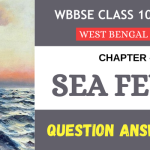“The Vagabond,” a famous poem by Robert Louis Stevenson, celebrates a life of freedom, nature, and adventure. This guide offers questions and answers to deepen understanding, helping readers explore its themes, poetic structure, and significance.
Literary Analysis Questions and Answers
Question What is the central theme of “The Vagabond”?
Answer
The central theme of “The Vagabond” is the poet’s desire for a life of freedom, adventure, and connection with nature, rejecting materialism and societal norms.
Question How does the poet portray his love for nature in the poem?
Answer
The poet uses vivid imagery like “the jolly sky,” “the road before me,” and “the rivers,” showing his deep admiration for the natural world.
Question What is the rhyme scheme of “The Vagabond”?
Answer
The rhyme scheme of the poem follows an ABAB pattern, which creates a rhythmic and flowing effect, reflecting the freedom of a wanderer’s life.
Question What poetic devices are used in “The Vagabond”?
Answer
The poem uses imagery, alliteration, and repetition to emphasize the beauty of nature and the poet’s yearning for a life of simplicity and freedom.
Question Why does the poet repeat the phrase “give to me” in the poem?
Answer
The repetition of “give to me” reflects the poet’s firm and passionate request for a life unbound by societal constraints, solely focused on nature and adventure.
Question How does “The Vagabond” contrast with materialism?
Answer
The poem contrasts materialism by emphasizing the poet’s rejection of wealth, comfort, and possessions in favor of a simple and free life close to nature.
Question What is the significance of autumn in the poem?
Answer
Autumn symbolizes change, decay, and the transient nature of life, yet the poet embraces it as part of his love for nature and the outdoors.
Question How does the poet define happiness in “The Vagabond”?
Answer
The poet defines happiness as living a free, adventurous life close to nature, without being burdened by materialistic needs or societal expectations.
Question Why does the poet reject companionship in the poem?
Answer
The poet rejects companionship because he values his independence and solitude, finding fulfillment in his bond with nature rather than with people.
Question How does the poem reflect Robert Louis Stevenson’s personal philosophy?
Answer
The poem reflects Stevenson’s philosophy of valuing freedom, nature, and individuality, which he often expressed in his life and works.
Question What is the tone of “The Vagabond”?
Answer
The tone is optimistic and celebratory, emphasizing joy and freedom, but it also contains a sense of defiance against societal norms.
Question What role does imagery play in “The Vagabond”?
Answer
Imagery vividly describes the poet’s love for nature and freedom, painting pictures of “a bed in the bush” and “the jolly sky.”
Question How does the poet view death in “The Vagabond”?
Answer
The poet views death with indifference, emphasizing that his desire for freedom and adventure remains strong even in the face of mortality.
Question What is the significance of the line “Nor a friend to know me”?
Answer
This line highlights the poet’s preference for solitude and independence, rejecting societal ties or relationships that might limit his freedom.
Question What does the phrase “the starry sky” symbolize in the poem?
Answer
“The starry sky” symbolizes the vastness and beauty of nature, offering the poet inspiration and comfort in his wandering life.
Question How is the mood of the poem established?
Answer
The mood is established through vivid imagery, rhythmic flow, and the poet’s celebratory expressions of freedom and love for nature.
Question What does the poet mean by “the bread I eat”?
Answer
“The bread I eat” refers to the poet’s acceptance of a simple, self-sufficient lifestyle, relying on basic necessities rather than luxuries.
Question What is the significance of the road in the poem?
Answer
The road symbolizes the poet’s journey through life, representing freedom, adventure, and the endless possibilities of exploration.
Question How does “The Vagabond” inspire readers?
Answer
The poem inspires readers by encouraging them to embrace freedom, connect with nature, and seek happiness beyond materialistic pursuits.
Literature Comprehension Questions and Answers
Question What literary movement does “The Vagabond” belong to?
Answer
The poem belongs to the Romantic literary movement, which emphasizes a deep connection with nature, individual freedom, and emotional expression.
Question How does the poet use contrast in “The Vagabond”?
Answer
The poet contrasts the simplicity of a wanderer’s life with the complexities of materialistic and societal living, emphasizing the joy in simplicity.
Question How does repetition affect the flow of the poem?
Answer
Repetition creates a rhythmic and emphatic effect, reinforcing the poet’s passionate desire for freedom and nature.
Question What is the significance of seasons in the poem?
Answer
The poet mentions seasons like autumn and winter to emphasize his unwavering love for nature, regardless of its challenges.
Question How does “The Vagabond” reflect escapism?
Answer
The poem reflects escapism by presenting a life free from societal constraints, focused solely on nature and self-sufficiency.
Question What is the meaning of “a bed in the bush”?
Answer
“A bed in the bush” refers to a life spent outdoors, sleeping under the open sky, symbolizing freedom and simplicity.
Question How does the poet use metaphors in “The Vagabond”?
Answer
The poet uses metaphors like “the road before me” to symbolize life’s journey and the pursuit of freedom.
Question How does the poem appeal to the senses?
Answer
The poem uses sensory imagery, describing sights like the “jolly sky” and the “starry night,” creating vivid mental pictures for readers.
Question Why is “The Vagabond” considered a timeless poem?
Answer
The poem’s themes of freedom, nature, and individuality resonate across generations, making it a timeless reflection of human desires.
Exploring “The Vagabond” helps readers understand the joy of a simple life close to nature. Its timeless message of freedom and individuality continues to inspire.
Latest Posts
- Step-by-step guide to download and apply for jee mains admit card 202
- Comprehensive 2025 government holidays and recruitment details for job seekers
- JEE Mains Admit Card 2025: Your Step-by-Step Guide to Downloading the Hall Ticket
- Everything You Need to Know About 2025 Government Holidays Recruitment
- Comprehensive Guide to rrb d group recruitment 2025 – Eligibility, Vacancies, and Application
- Detailed guide to nps trust recruitment 2025 vacancies, eligibility and apply process
- Comprehensive guide to hpcl recruitment 2025 notification, vacancies, and application process
- ignou bed admission 2025 complete recruitment guide with eligibility and process
- Comprehensive Guide to Indian Army Agniveer Recruitment 2025 Notification and Jobs
- Everything You Must Know About CBSE Board Exams 2025 Changes & New Rules




